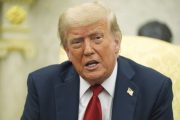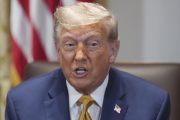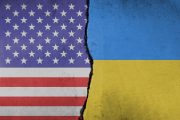North Korea’s Vice-Foreign Minister Han Song-Ryal asserted that it is “crystal clear” that U.S. President Donald Trump is “hell bent” on prompting war with North Korea, adding, “A nuclear war could break out at any moment on the Korean Peninsula.”
The North Korean went on to state, during an interview with the BBC’s John Sudworth in Pyongyang, “We’ll be conducting more missile tests on a weekly, monthly and yearly basis.” Taking an increasingly bold tone, Han told the BBC, “If the U.S. is planning a military attack against us, we will react with a nuclear pre-emptive strike by our own style and method.”
Han told the BBC that North Korea believed its nuclear weapons “protect” it from the threat of U.S. military action. “If the U.S. is reckless enough to use military means it would mean from that very day, an all-out war,” he threatened.
The emboldened North Korean rhetoric was also delivered at a news conference at the UN on April 17, where North Korean Ambassador Kim In-ryong condemned the April 6 U.S. missile strikes in Syria, which targeted an air base following an alleged chemical attack by Syria’s government.
Kim said the United States was “disturbing global peace and stability and insisting on the gangster-like logic that its invasion of a sovereign state is decisive and just and proportionate and contributes to defending the international order.”
Pyongang’s UN ambassador also accused the United States of turning the Korean Peninsula into “the world’s biggest hot spot” and creating “a dangerous situation in which a thermonuclear war may break out at any moment.”
Kim told a news conference that “if the U.S. dares opt for a military action,” North Korea “is ready to react to any mode of war desired by the U.S.”
While most military experts believe that North Korea does not possess the weaponry to threaten the United States, directly, the communist North could potentially target U.S. bases in South Korea or Japan. An April 18 AFP report published in Japan Times observed, “North Korea could react to a potential U.S. strike by targeting South Korea or Japan, and officials in both countries have been ill at ease with the more bellicose language deployed by President Donald Trump’s administration.”
Tensions between communist North Korea and the United States and its allies in the region have escalated since North Korea’s state-run Korean Central News Agency (KCNA) reported on March 7 that the nation’s launch of four missiles the previous day was part of practice tests to hone its ability to strike U.S. military bases in Japan.
During a White House press conference on March 6, White House Press Secretary Sean Spicer stated,
The launches are consistent with North Korea’s long history of provocative behavior. The United States stands with our allies in the face of this very serious threat. The Trump administration is taking steps to enhance our ability to defend against North Korea’s ballistic missiles, such as through the deployment of a THAAD battery to … South Korea.
As the crisis continued, the United diverted the U.S. Navy Carrier Strike Group 1 — which includes the Nimitz-class aircraft carrier USS Carl Vinson — from Australia to the western Pacific Ocean near the Korean peninsula. The decision to divert the strike group Carl Vinson to waters near the Korean peninsula was intended as a show of force, a U.S. official told Reuters afterwards. The timing of the diversion, coming shortly after the U.S. missile attack on Syria on April 6, may have been intentional, to send a message to the North Koreans that the United States will not hesitate to use force when its government deems it to be advisable.
During a visit to meet with U.S. troops in the demilitarized zone between North and South Korea on April 17 Vice President Mike Pence warned the North Koreans not to underestimate U.S. resolve in dealing with the Pyongyang regime. Pence said, “Just in the past two weeks, the world witnessed the strength and resolve of our new president in actions taken in Syria and Afghanistan. North Korea would do well not to test his resolve — or the strength of the armed forces of the United States in this region.”
Reuters reported that Pence, speaking alongside South Korean Acting President Hwang Kyo-ahn, said the United States would stand by its “ironclad alliance” with South Korea. “All options are on the table to achieve the objectives and ensure the stability of the people of this country,” he said.
Pence’s statement came just two days after the North Korean government conducted a huge display of prototype intercontinental ballistic missiles during a military parade observing the 105th anniversary of the birthday of the communist state’s late founding leader and “eternal president” Kim Il-sung in the capital Pyongyang on April 15. Kim Il-sung’s grandson, Kim Jong-un, currently heads the Pyongyang regime.
After visiting South Korea, Pence moved on to Japan, where he visited a U.S. naval base and met with Prime Minister Shinzo Abe and other leaders. Speaking to reporters, Pence said, “It is our belief by bringing together the family of nations with diplomatic and economic pressure we have a chance of achieving a freeze on the Korean Peninsula.”
“We will not rest and will not relent until we obtain the objective of a denuclearized Korean Peninsula,” Pence continued, and he reassured Japan’s leaders that the United States would continue to support them.
Pence told journalists that the White House hoped China would use its “extraordinary levers” to pressure North Korea, the Associated Press reports.
The BBC’s Stephen Evans in Seoul reported that U.S. policy now seems to be to persuade China to contain North Korea by keeping economic and military pressure on the ruling regime.
Photo of North Korean submarine-based missile in a parage in Pyongyang: AP Images
Related articles:
North Korea Warns of Nuclear Retaliation at Any Sign of U.S. “Aggression”
North Korea Admits Missile Launches Were Test of Possible Strike Against U.S.Bases in Japan
North Korea Missile Test Draws Reactions From Trump, Abe, and UN
North Korea Claims to Test H-Bomb
North Korea Postures With Nuclear Warning, Movement of Missiles
North Korea Attacks South Korea
The Aftermath of the Sinking of the South Korean Ship Cheonan
North Korea Prepares to Launch Missile
North Korea Issues Threats During U.S.-S. Korean Joint Exercise
North Korea Sentences U.S. Student to 15 Years of Hard Labor
Lawmakers Blast UN for Handing U.S. Technology to North Korea, Iran




